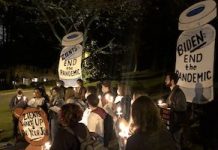
The stakes couldn’t be higher at COP26, the UN Climate Conference in Glasgow, Scotland, where almost all the countries in the world are now gathered to address the climate crisis. While government officials and industry leaders are inside the meetings, frontline climate activists – those dealing with disruptions to their lives due to the mining, transport, combustion and disposal of fossil fuels – are raising their voices outside, demanding to be heard.
The U.S.-based activist group Code Pink, Women for Peace, founded in 2002 in response to the Bush administration’s post-9/11 color-coded threat levels and its then planned invasion of Iraq, will be there in Glasgow. Women-led Code Pink is an organization that works to end war and shift funding away from military spending toward funding basic human needs.
Between The Lines’ Melinda Tuhus spoke with the group’s co-founder, Jodie Evans, shortly before she departed from the U.S. to Glasgow. Here she talks about how the world’s military contributes to the accelerating climate crisis, and her expectations for what can be accomplished at the Glasgow UN Climate Summit.
JODIE EVANS: War is the greatest contributor to climate change. It uses more fossil fuel than 140 countries. It devastates pristine ecosystems. It leaves forever chemicals in the ground. And it destroys the very fabric of our society, as we have seen in the last 20 years in this war on terror. And the fact that the last 20 years of the war on terror cost $22 trillion is a crime against humanity, and has murdered more than a million people. This needs to be part of the movement to save the planet, because don’t forget these weapons include nuclear weapons and one of the things they don’t talk about in the effects of climate change is the climate catastrophe that is the nuclear winter.
MELINDA TUHUS: I feel like most climate activists still don’t talk much about the role of the military in creating a vast amount of emissions. It’s all about the fossil fuel companies, the banks, maybe the role of agriculture. Do you feel like Code Pink and other peace groups have made any headway in this regard?
JODIE EVANS: Oh, yes, progress in the last four years has been enormous, and it started with us taking on BlackRock. Code Pink took on BlackRock because (CEO Larry) Fink said he was a socially responsible investor, and they’re invested heavily in weapons. So we went after him, and then the environmental movement recognized he’s invested in everything damaging. Working together on the BlackRock campaign has helped integrate the anti-war movement and the environmental movement, and we’ve been working together for the last three years and in the process educating each other about our issues. They’ve really come to understand the devastation of war to the planet, and not only that, but these wars are also fought for oil and other extractive minerals, so they’re fought to extract from the planet, which continues the damage to the planet. And $2 trillion of weapons a year are sold globally; that is already a devastation to the planet just to create them, and then if they’re used, that’s another devastation to the planet.
The U.S. military understands the link to climate change, but instead of stopping their participation in creating climate change, they are over-militarizing, because when climate change disasters happen, they are going to respond militarily, which is a disaster. And we saw that happen in New Orleans and other places, and that is not the way you respond to climate catastrophe – you respond with care and support to the needs of the people, and the fact that their response continues to be militarism is also something we should be very worried and afraid of.
MELINDA TUHUS: Jodie Evans, my expectations are pretty much zero for meaningful results to come out of this climate summit. All these summits just seem like an incredible waste of carbon emissions, with thousands of people jetting in from all over the world. What do you hope will come out of it?
JODIE EVANS: You know, that’s why we call it the Conference of the Polluters. These are the polluters, and these are the people who represent, mostly, capitalism, which I call the war economy. The extractive, destructive, oppressive economy. And war serves the war economy. And we will not stop war until we stop the war economy. And I think what’s important is that the people continue to ridicule and shame those in power for not moving to save people and planet. And what’s going to come out – and thank you for having a show and talking about this – is that we need to talk about it. We need to take our leaders down about it. We need to demand something different for the future of our children and our grandchildren. It’s a full-on disregard for life and an only regard for money, and we have to stop that.
But what happens in the streets and what happens when we show the stories is that we’re emboldened to continue to be in the streets. We’re emboldened by the messages we hear. We’re emboldened by the stories we can share so we can continue to build the movement to stop this madness. We have to demand, we have to be in the streets, you know this is a movement that needs to continue to grow. And so, of course, very little will come out of COP, as it usually does. Look, the U.S. military is not even showing up.
For more information, visit Code Pink Women for Peace at codepink.org.




